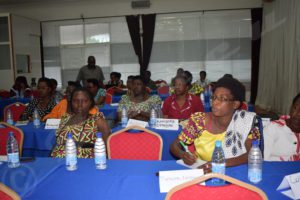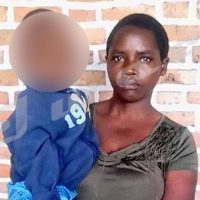The main problem Burundi women are currently faced with is their limited participation in decision-making process, says a woman leader.

Women leaders from the provinces of Rumonge and Bujumbura city attending the workshop.
45 women leaders from Rumonge and Bujumbura city provinces have been trained in negotiation techniques to allow them to express their opinions and be part of the country’s decision-makers. The aim was to design policies to prevent gender-based violence and promote the participation of women in the decision-making process. The workshop was organized on 30 December by the Concentration of Collectives of Women’s Associations in the Great Lakes Region -COCAFEM in partnership with Care International and the Ministry of Human Rights.
“It is important for women representatives to know how to defend their common interests. We taught them how to influence the decision-making process especially in adopting or putting in place laws that prevent gender-based violence and in protecting the victims or amending laws that contain elements that violate their rights, “said Alphonsine Bigirimana, a facilitator.
Joselyne Ntahomvukiye, a participant, said she learned that it is first necessary to understand the problems of the people one represents to better identify to whom to present their grievances. “We have noted that the main problem faced by Burundian women is their low participation in the decision-making process,” she says. Ntahomvukiye hopes that gender-based violence will significantly decrease thanks to women leaders ‘commitment.
She said cohabitation is a problem that many women face in Rumonge southern province. “We ask the local authorities to explain its danger to the population.”Such workshops were organized at the same time in Kayanza, Ngozi and Gitega provinces.
COCAFEM is made of 11 collectives of Women’s Associations of the Great Lakes Region, including 3 associations from Burundi, 5 from DRC and 3 from Rwanda. It was created in 2001 when human rights, especially women and children’s rights were flagrantly violated due to crises the Great Lakes region was experiencing. Women decided to join forces to defend their rights and advocate the end of violence against them.



















 IWACU Open Data
IWACU Open Data

